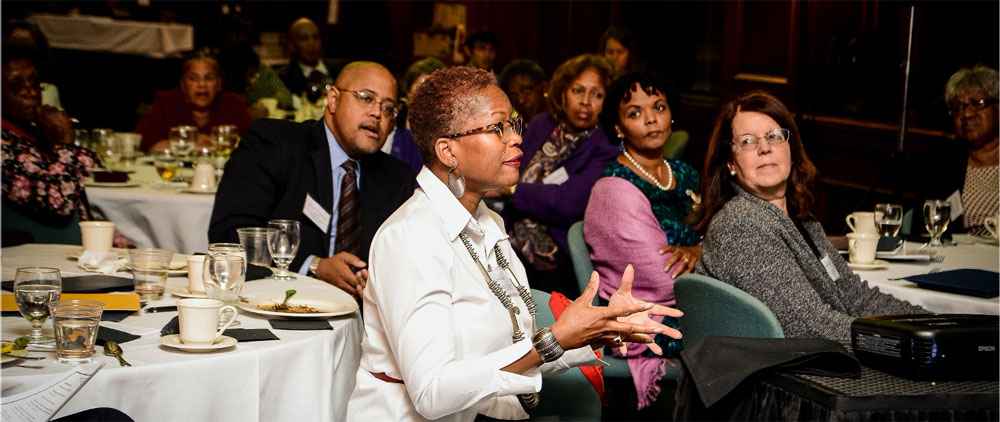Community Board

The Johns Hopkins Alzheimer’s Disease Research Center (ADRC) recognizes the need to maintain an effective and mutually satisfying partnership with the community it serves. To that end, a Memory and Aging Community Advisory Board has been formed. It is made up of local community leaders with an interest in dementia, including representatives of the local community (i.e., pastoral leaders, heads of community organizations, health officials from State/City/County Departments, political leaders, representatives of the Alzheimer’s Association, and families of patients who have been touched by Alzheimer’s Disease).
For more information about the Community Board, visit the Board’s website or contact Dr. Corinne Pettigrew at 410-614-0363 or e-mail [email protected].
The Memory and Aging Community Advisory Board (MACAB) is a group of dedicated people whose overall concern is the physical, mental, and social well-being of the senior community of Greater Baltimore. The MACAB was formed in 2004 and is comprised of community leaders, health professionals, and families who have been touched by dementia including Alzheimer’s disease. This group works with the Johns Hopkins Alzheimer’s Disease Research Center (JHADRC) and the Johns Hopkins Memory and Alzheimer Treatment Center (MATC) and various other groups to help increase community access to healthcare, knowledge, and research opportunities related to Alzheimer’s disease, memory loss, and senior health.
The mission of the MACAB is to focus on four of the most critical needs in addressing the impact of dementia including Alzheimer’s disease and related disorders on Greater Baltimore residents and caregivers. These needs include:
– Education – Increase access of AD education and care interventions in the Greater Baltimore community
– Recruitment – Enhance the integrity of Alzheimer’s research through recruitment of individuals with a broad range of risk factors for cognitive decline
– Communication about research – Provide a forum for community concerns about research
– Revisions in procedures – Improve research so that it is consistent with community goals and needs
Three committees work to facilitate the goals of the MACAB
Board Development Committee: The Board Development Committee will work with the Executive Committee to set priorities for membership recruitment, plan new member orientation, evaluate member satisfaction and recommend updates to bylaws.
Examples of potential activities include:
Identifying individuals who are interested in joining MACAB, conducting phone or in-person interviews with potential members, assisting in orientation of new members, developing surveys to evaluate member satisfaction and contacting members that have missed several meetings.
Community Education Committee: The Community Education Committee will work with the Executive Committee to identify community events the MACAB might support, help recruit volunteers for events, and participate in community events.
Examples of potential activities include:
Arranging for a presentation on Memory Loss at a senior center, contacting a church to determine their interest in hosting an event on Memory Loss, volunteering 2-4 hours of time to help manage the MACAB table at a health fair.
Research Committee: The Research Committee will work with the Executive Committee to provide researchers with guidance on the development of recruitment and outreach activities.
Examples of potential activities include:
Reviewing a flyer or brochure to provide input on whether the study description is clear and easy to understand, reviewing slides prepared for a presentation to be sure they are easy to understand and reflect community interests, participating on a panel at a community event where Memory Loss is discussed.
Media and Communications Committee: The Media and Communications Committee works with the Executive Committee to update, maintain, and develop content for the MACAB website and social media pages.
Examples of potential activities include:
Making regular updates to the MACAB website, providing content for social media pages (such as Facebook).
Members of the Memory and Aging Community Advisory Board include: Jacquelyn Seth (Chair), Mica Saunders (Vice-Chair), Ernestine Jones Jolivet (Board Development Chair), Anna Smolensky (Community Education Committee Chair), Jose Jimenez (Media and Communications Committee Chair), Corinne Pettigrew (Research Committee Chair), Marilyn Albert, Thomasine Baskerville, Crystal Day-Black, Dawnita Brown, Regina Clark, Chanel Crowder, Crystal Evans, Teriko Epps, Jessea Gabbins (Secretary), Casandra Gipson, Maria Gray-Bowie, Peggy Jackson, Marlyn Taylor Massey, Elouise Mayne, Andrea Nelson, Deborah Peaks-Coleman, Mary Ellen Smackum, and Candace Vice.
The Johns Hopkins Memory Center will offer Board members the following benefits and resources:
1. Staff support for local community events aimed at senior with and without memory disorders.
2. Promotion of advocacy groups and community leaders within the Johns Hopkins University network.
3. Referral to Hopkins care and research opportunities.
4. Opportunities to attend educational seminars and lectures.
Board members will participate in the following activities:
1. Attend 3-4 daytime meetings per year (quarterly) at Johns Hopkins Mount Washington Campus.
2. Serve as ambassadors that distribute information regarding the memory disorders within the community.
3. Provide feedback on the research to investigators through participation in panel discussions, written recommendations, or review of study brochures.
4. Help the MACAB form relationships with community leaders and advocacy groups.
Volunteer service opportunities offered by the Memory Center include:
1. Represent the MACAB at 1-2 local events.
2. Arrange or conduct an educational presentation on memory loss.
3. Participate in panel discussions regarding memory loss, mental health, and research
4. Participate on one a committee of the MACAB concerning either education, research or membership.
MACAB Meetings:
– February 13, 2024 ( 9:00am – 10:30am )
– April 9, 2024 ( 9:00am – 10:30am )
– July 9, 2024 ( 9:00am – 10:30am )
– November 12, 2024 ( 9:00am – 10:30am )
Holistic Health Seminar on Memory Loss – virtual via Zoom
– June 1, 2024 ( 9:00am – 11:00am )
MACAB Annual Dinner Meeting:
– October 22, 2024 ( 5:30pm – 8:00pm )
